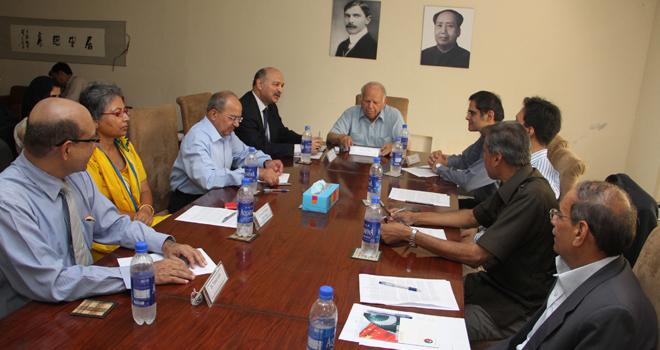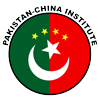PCI holds In House Briefing
Date : September 02, 2013
 |
On 26 August 2013, PCI held a briefing by Senator Mushahid Hussain, attended by individuals from academia, think tanks and media. The purpose of the briefing was to disseminate the proceedings of the trilateral track II dialogue between the think tanks of China, Afghanistan and Pakistan in Beijing on 6 August 2013. Discussants for the briefing included Mr. Raza Rumi, Director of the Jinnah Institute and Ambassador Mr. Akram Zaki.
The Chairman of PCI, Senator Mushahid Hussain introduced the PCI led initiative of holding a trilateral dialogue between Pakistan, China and Afghanistan at a non-governmental level. The first dialogue was held at the China Institute of International Studies (CIIS) office in Beijing.Mr. Dong Manyuan and Former Ambassador of China to Pakistan, Zhou Gang were representing the Chinese delegation, while Sayed Hamed Gilani and Dr. Davood Muradian were representing think tanks from Afghanistan. The delegation from Pakistan led by Senator Mushahid Hussain, also included Mr. Ahmed Bilal Mehboob and Ambassador Ali Sarwar Naqvi. The Chairman also informed the guests that PCI would be hosting the Second Trilateral Conference between the three countries in Islamabad in May 2014.
Speaking on the trilateral cooperation between China, Afghanistan and Pakistan, Senator Mushahid Hussain said that the balance of economic, cultural and political power was shifting from West to the East, with the 21st century generally perceived as the Asian Century.He further stated that today, we are witnessing the emergence of a ‘Greater South Asia’ which includes the South Asian states with broader integral inclusion of China, Myanmar, Afghanistan and Iran, knit together by trade, investment, culture, as well as cooperation in energy, economy, and education. Emphasizing the need for trilateral cooperation among the three countries, he saidas a neighbour of both Pakistan and Afghanistan, China was a pivotal, strategic stakeholder for stability in the region, particularly in the post-2014 phase of the NATO/US withdrawal from Afghanistan.He stated that, “the Pakistan-China Economic Corridor, was a new model of economic development, which can also benefit new emerging regional cooperation in a Greater South
Asia, driven primarily by economy, energy, building pipelines, ports, roads and rail infrastructure, all which can transform the lives and future of the region.”.In addition, he pointed out that a major factor of concern was the lack of an institutionalized peace process in Afghanistan.Referring to the Beijing dialogue between China, Afghanistan and Pakistan, he said that while China opposes American bases or an American troop presence in Afghanistan beyond 2014, the Afghan delegate in Beijing had disclosed that Kabul and Washington were close to an agreement under which 20,000 American troops are likely to stay on in Afghanistan indefinitely.

Mr. Raza Rumi, Director of Jinnah Institute,asserted that there are three critical dimensions to the regional relationship, which have a relatively unexplored framework. The first dimension, he highlighted, was the crucial need for energy. He explained, that to sustain a high level of growth rate China will be looking towards the vast untapped resources of the Central Asian countries including Afghanistan, which make it a crucial stakeholder in the region post 2014. Mr. Rumi also warned that it was important not to exclude India, which will also be competing for supply of energy in the region. He assessed that since both India and Pakistan have a large section of their population below thirty, in the next fifteen years 3 million jobs will need to be generated to match the employment needs of the young demographic. The second dimension, he stated was extremism and terrorism, Afghanistan for the past thirty years has been in an unstable phase and he stated that China will be concerned regarding the anti-state extremist Uygur rebellion groups. The dilemma faced by Pakistan was how to control and maintain peace and stability at its ungoverned borders. The third dimension he highlighted, was the future of theGwadar port. This energy corridor would be crucial for not only Pakistan and China, but also the larger concept of Greater South Asia. There would be certain obstacle, such as the Baluch insurgency and lack of infrastructural facilities, which the present governmentwould needs to resolve. He also suggested that Iran should be addedto the dialogue of finding a solution to the regional problems.
The chair for the session Ambassador Akram Zaki discussed how the current situation in the region evolved. “With the disintegration of the Soviet union, the proposal about the Economic Corridor did come under discussion and in November 1992, in a conference in Islamabad, all six Central Asian countries as well as Afghanistan decided that the corridor must be built”, he stated. He further said that the efforts didn’t materialse as the destabilization of Afghanistan was a given policy of the great game and also a hindrance to the Quetta Plan Action which was proposed in 1993. Elucidating his point, he said that the same thing happened with Gwadar Port which was inaugurated in 1992 but remained dormant till 2001. Commenting on the present situation, Mr. Zaki told the participants that stabilization in Afghanistan seems difficult at the moment and the turmoil is likely to continue which will only exacerbate the situation further.
A lively and interactive discussion took place among the invited guests regarding topics such as the role of Russia, terrorism in Xinjiang, the United States military presence in Afghanistan, the feasibility of the future economic corridor in the region and security instability within Pakistan.
